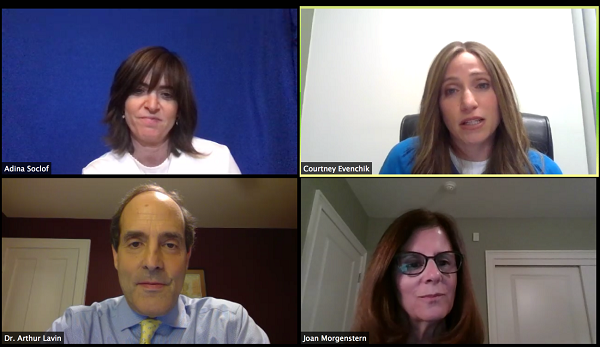06/15/2020
Federation Webinar Gives Children, Parents Tips to Embrace New ‘Normal’
- Share This Story

Top left, Adina Socolf, top right, Courtney Evenchik, bottom left, Dr. Arthur Lavin, bottom right, Joan Morgenstern.
Article reprinted with permission from Cleveland Jewish News
by SKYLAR DUBELKO | STAFF REPORTER
The Jewish Federation of Cleveland in Beachwood’s Webinar, “Thriving in Survival Mode: Practical Tips for Parents with Young Children,” offered guidance on creating balance, structure, coping with changing relationships and building resiliency and responsibility in children.
Moderator Courtney Evenchik lead the June 10 conversation with Dr. Arthur Lavin, a Beachwood-based pediatrics specialist; Joan Morgenstern, director of parent education and community outreach at Senders Pediatrics in South Euclid; and Adina Soclof, a parent educator, professional development instructor and speech pathologist who works with children in a school setting.
Evenchik is the director of school psychology services at A+ Solutions in Beachwood.
“All four of us have worked together over the years on many occasions so it’s good to be back together again and we’re thrilled that over 100 people have joined us this evening,” Lavin said. He said it is important to recognize the “tough spot” parents are in due to COVID-19 pandemic related household changes and noted nature of screen time has undergone a “tremendous revolution.”
“People are getting used to visiting their doctor on screen, people are now used to going to school on screen,” Lavin said.
He said the American Academy of Pediatrics has long argued against screen time for children under the age of 2.
“The thought was: there’s always something better to do than sit in front of a screen, (but) I have to say, I was never convinced that was harmful,” Lavin said. “I think I would agree there was always something better to do back in the old days when there were lots of things to do, but I’m not sure I could tell you in the fourth grade which 2 year olds spent an hour a day on screen time and which didn’t. It’s not clear to me what sort of damage came from that.”
Lavin said is an important point to consider as families spend more time together at home, indoors.
Morgenstern spoke about balancing expectations and flexibility for parents who want to maintain structure for their children’s stability, as well as their own sanity.
“It takes a village to raise a child, it takes more than a village to navigate a pandemic and we’re all in this together,” Morgenstern said. “I think we’re all experiencing expectations that we may have had three and a half months ago that are not coming to fruition this summer because of COVID-19. So instead of getting kind of stuck in expectations, it might be more helpful thinking about how we might be able to maintain a positive or open mindset.”
Morgenstern said it’s important to embrace the “not-so-new normal” parents have found themselves navigating this summer and recognize there might be hidden treasures.
Evenchik offered advice on how parents can create a sense of calm and safety when the world around them is so uncertain while also helping children build resilience.
Evenchik identified three key factors: reassurance, connection and self-regulation.
“You want to reassure children about their own safety and the safety of their family and friends,” Evenchik said. Noting humans are hardwired for connection, Evenchik said children with close ties to family, friends and school are more likely to have a solid sense of safety and security.
“One thing we can do as parents is, from time to time, do an emotional check in with our kids,” Evenchik said. “See how they’re doing and if they have any questions on their mind or something they might want to talk about.”
Evenchik said it’s also important to find time to play with your children.
With the economy opening up and the pandemic becoming more visible, Soclof spoke about children seeing people wear masks.
“If we’re not scared and we give a positive spin on it, then I think our children will just take our cues,” Soclof said. “If we say things like, ‘Look at everybody, everybody is working so hard to keep each other healthy and everybody’s wearing masks because ... our community cares so much and wants to make sure that everybody is healthy.
“I think that’s one way that we can spin it and also just showing the kids the mask and having them feel it and having them try them on to see that it’s not that scary.”

